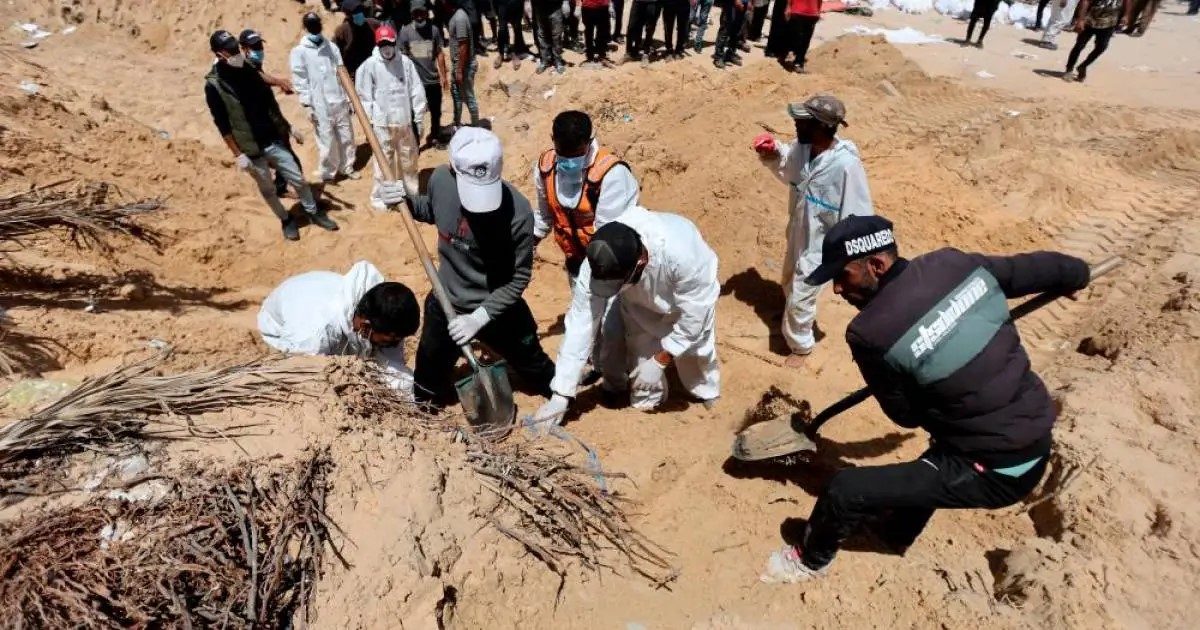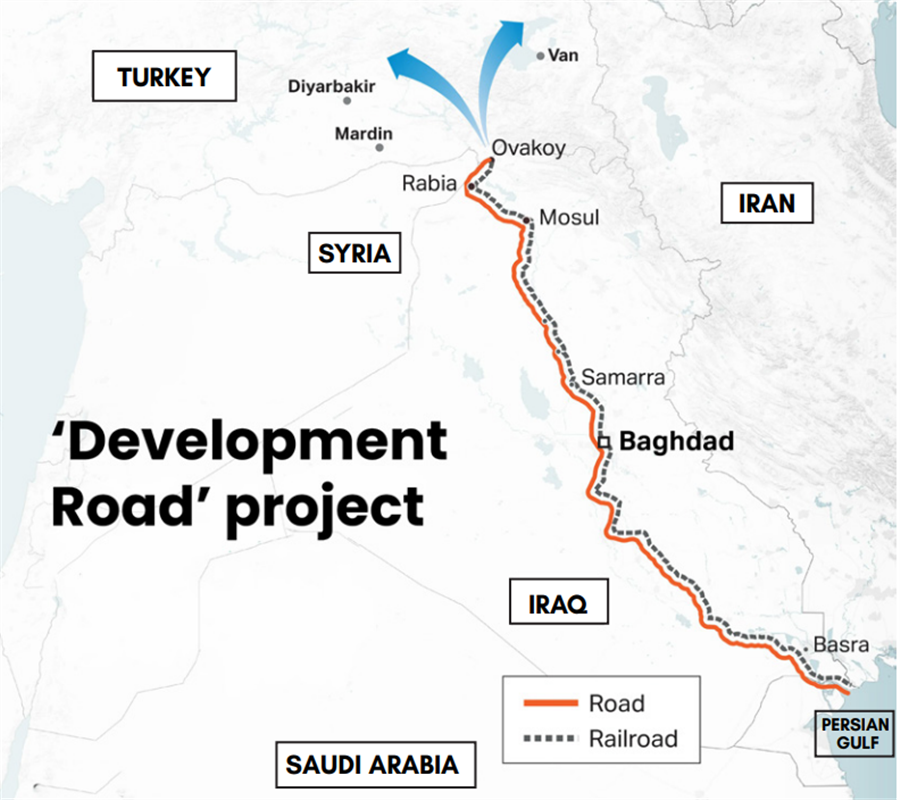Yeni Safak – April 22, 2024
Over 280 bodies found in mass grave at hospital in Gaza's Khan YounisMass grave found at Nasser Hospital in Khan Younis after Israeli troop withdrawal from city
Anadolu Agency
Health workers have uncovered at least 283 bodies of people from a mass grave at the Nasser Hospital in the southern city of Khan Younis, Gaza's civil defense agency said Monday.
“Civil defense crews retrieved 73 more bodies from the mass grave, bringing the total figure to 283 bodies since Saturday,” the agency said in a statement.
According to the statement, civil defense crews are still searching for more bodies in the grave.A mass grave was found in the hospital's courtyard on Saturday after the Israeli army withdrew from the city on April 7 following a 4-month ground offensive.
According to Ismail al-Thawabteh of Gaza's government media office, around 700 people have been unaccounted for since the Israeli army withdrawal from the city.
"We believe that there are hundreds of bodies still missing after being executed by the Israeli occupation and buried in mass graves,'' he told Anadolu.
Israel has waged a brutal offensive on the Gaza Strip since a cross-border Hamas attack on Oct. 7 last year, which Tel Aviv says killed nearly 1,200 people.At least 34,151 Palestinians have since been killed, mostly women and children, and 77,00 others injured amid mass destruction and severe shortages of necessities.
The Israeli war has pushed 85% of Gaza's population into internal displacement amid acute shortages of food, clean water and medicine, while 60% of the enclave's infrastructure has been damaged or destroyed, according to the UN.Israel stands accused of genocide at the International Court of Justice.
An interim ruling in January ordered Tel Aviv to stop genocidal acts and take measures to guarantee that humanitarian assistance is provided to civilians in Gaza.
https://www.yenisafak.com/en/world/over-280-bodies-found-in-mass-grave-at-hospital-in-gazas-khan-younis-3681870
Türkiye, Iraq, Qatar, UAE sign deal on Development Road project
President Recep Tayyip Erdoğan and Iraqi Prime Minister Mohammed S. Al Sudani on Monday oversaw the signing of a preliminary agreement between Türkiye, Iraq, Qatar and the United Arab Emirates (UAE) to cooperate on the Development Road project.
The deal on the landmark road and rail project that is expected to consolidate economic ties between the two neighbors came on the sidelines of Erdoan's long-awaited visit to Baghdad, the first by a Turkish leader since 2011.
Accompanied by a large delegation, Erdoğan held talks with Iraqi President Abdel Latif Rashid and Al Sudani. Cooperation on big economic projects was also on the table.
Erdoğan and Al Sudani witnessed the signing of the four-way memorandum of understanding (MoU) for joint cooperation on the Development Road project, with Qatari and Emirati ministers in attendance, a statement from the prime minister's office said.
Iraq launched the $17 billion project last year to link a major commodities port on its southern coast by rail and road to the border with Türkiye.
The 1,200-kilometer (745-mile) road and rail project aims to turn Iraq into a transit hub, connecting Asia and Europe with a link between the country's Grand Faw Port in the oil-rich south and Türkiye in the north.
Iraqi and Turkish officials signed 24 memorandums of understanding during Erdoğan's one-day visit.
Addressing a joint news conference with Al Sudani, Erdoğan said the agreements were part of a solid road map for cooperation, highlighting the importance of the Development Road deal.
Bilateral trade was worth $19.9 billion in 2023, down from $24.2 billion in 2022, according to official Turkish data. In the first three months of 2024, Turkish exports to Iraq rose 24.5%, while imports fell 46.2%.
Security cooperation
The trip comes as regional tensions spiral, fueled by the Israeli offensive on Gaza and attacks between Israel and Iran.
Iraq is Türkiye's key trade ally in the region. However, relations have been strained over what Ankara sees as Baghdad's insufficient cooperation in its fight against the PKK terrorist group, as well as a row over oil exports.
Türkiye often launches strikes against targets in the region, which Baghdad has said is a breach of its sovereignty. Ankara says it must protect itself against the PKK, which Türkiye and its Western allies designate as a terrorist group.
Counterterrorism dominated Erdoğan's talks in Iraq, and the president said they discussed joint steps to be taken on the matter.
Erdoğan told Rashid that Türkiye "had expectations from Iraq in the battle with the PKK terrorist organization, that Iraq must eradicate all sorts of terror."
He stated they decided to set up joint permanent committees for cooperation in many fields, from counterterrorism, economy, health, and transportation to education.
Erdoğan said Türkiye appreciated Iraq's move to declare PKK a banned organization and was ready to endorse any steps Baghdad would take to declare it as a terrorist group.
"We will move forward in (the fight) against the PKK together," he said. "The PKK's presence in Iraq will end soon," he added. Erdoğan noted that Türkiye cannot allow attacks from Iraqi soil to another country.
Oil exports
After meetings in Baghdad, Erdoğan was set to travel to Irbil, the capital of the Kurdistan Regional Government (KRG), a semi-autonomous entity controlling Iraq's north.
The visit was also expected to weigh on the dispute over oil exports from the KRG, which has been a particular sticking point.
The Iraq-Türkiye oil pipeline, which once handled about 0.5% of global oil supply, has been offline since March 2023, when Ankara halted flows following an arbitration ruling by the International Chamber of Commerce (ICC).
The ICC said Ankara should pay Baghdad damages of $1.5 billion over what it said were unauthorized exports by KRG between 2014 and 2018. Türkiye, on the other hand, said the ICC had recognized most of Ankara's demands. Its Energy and Natural Resources Ministry said the chamber ordered Iraq to compensate Türkiye for several violations concerning the case.
About 450,000 barrels per day of crude once flowed through Iraq's northern route via Türkiye, and its closure has led to the loss of more than $14 billion for Iraq, the Association of the Petroleum Industry of Kurdistan (APIKUR), which represents international oil companies active in the region, estimates.
KRG exports flow through a pipeline to Fish-Khabur on the northern Iraqi border, where the oil enters Türkiye and is pumped to the port of Ceyhan on the Mediterranean coast.
Talks on resuming exports have stalled. Last month, Iraq's Oil Ministry said foreign oil firms operating in KRG are partly to blame for the delay in resuming crude exports after failing to submit contracts for revision.
Iraq launches $17B project to link Asia, Europe through Türkiye
Iraq launched a $17 billion project on Saturday to link a major commodities port on its southern coast by rail and roads to the border with Türkiye, in a move designed to transform the country's economy after decades of war and crisis.
The Development Road aims to tie the Grand Faw Port in Iraq's oil-rich south to Türkiye, turning the country into a transit hub by shortening travel time between Asia and Europe in a bid to rival the Suez Canal.
"The Development Road is not just a road to move goods or passengers. This road opens the door to developing vast areas of Iraq," Farhan al-Fartousi, director general of the General Company for Ports of Iraq, told Reuters.
Iraq's government envisions high-speed trains moving goods and passengers at up to 300 kilometers (186.41 miles) per hour, links to local industry hubs and an energy component that could include oil and gas pipelines.
It would mark a significant departure from the country's existing aged transport network.
Iraq's train service currently operates a handful of lines, including slow oil freight and a single overnight passenger train that trundles from Baghdad to Basra, taking 10 to 12 hours to cover 500 kilometers.
The Grand Faw Port, which was devised over a decade ago, is halfway to completion, Fartousi said.
Passenger transport between Iraq and Europe harkens back to grand plans at the turn of the 20th century to create a Baghdad to Berlin Express.
"We will make this line active again and tie it to other countries," Fartousi said, noting plans to ferry tourists and pilgrims to Shiite holy sites in Iraq and Mecca in Saudi Arabia for the Haj pilgrimage.
The project was announced on Saturday at a conference aimed at courting Arab interest from Arab Gulf states, Syria and Jordan. A senior government aide said regional investment was on the table.
Promises of development are long-standing in Iraq, but infrastructure remains decrepit even as the government of Prime Minister Mohammed Shia al-Sudani pushes to rebuild roads and bridges.
But officials say the Development Road is based on something new: A period of relative stability since late last year that they hope can be maintained.
If work starts early next year, the project would be completed in 2029, Fartousi said.
"Even if Iraq was absent for a year or decade or decade, it must return one day or another. Hopefully, these days are the beginning of the return of Iraq," he said.

|
Published since July 2008 |
Your donation
is tax deductable.
The Journal of America Team:
Editor in chief:
Abdus Sattar Ghazali
Senior Editor:
Prof. Arthur Scott
Special Correspondent
Maryam Turab




